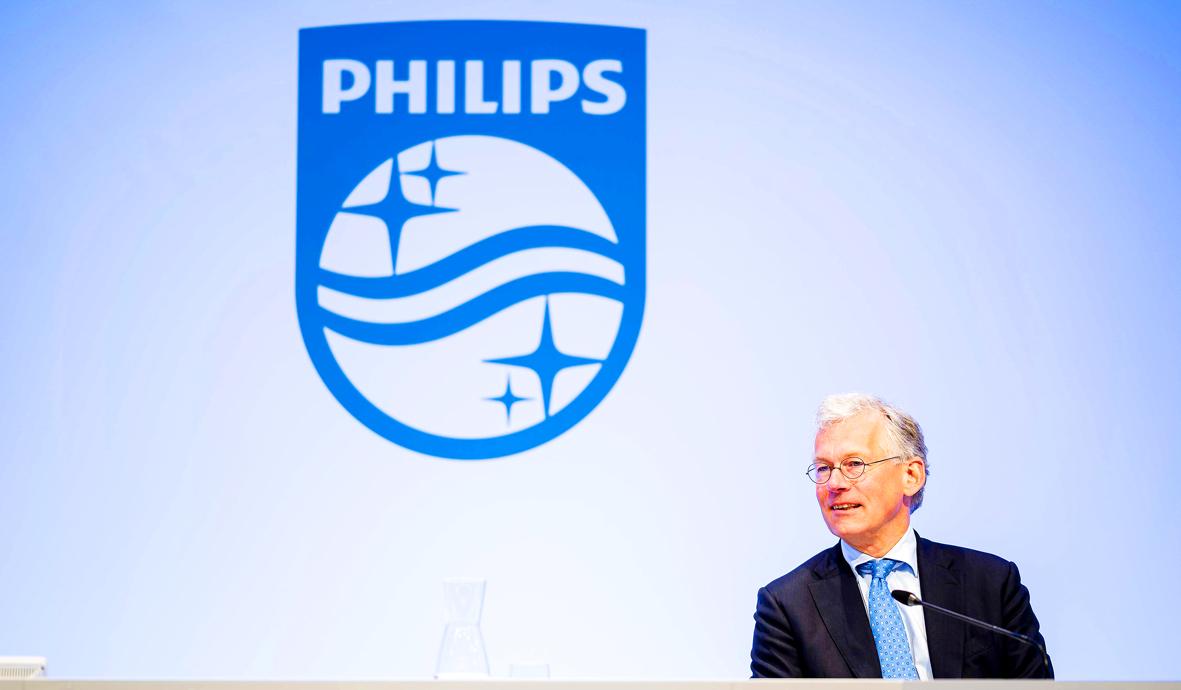Dutch firm Royal Philips NV yesterday said that net profit fell in the second quarter due to the COVID-19 pandemic, but said it expects to return to growth in the second half of the year.
Philips, which recently abandoned its home appliance arm to focus on the health sector, said its net profit sank 14.63 percent year on year to 210 million euros (US$240.35) compared with 246 million euros last year.
“As anticipated, COVID-19 caused a steep decrease in consumer demand,” with the effect on non-virus hospital procedures involving its equipment having a particular impact, Philips chief executive officer Frans van Houten said in a statement.

Photo: EPA-EFE
Sales dropped 6 percent year-on-year to 4.4 billion euros.
Demand for equipment including driven by CT imaging systems, hospital ventilators and patient monitors caused orders to grow by 27 percent.
“We have steeply ramped up the production volumes of acute care products and solutions to help diagnose, treat, monitor and manage COVID-19 patients,” Van Houten said.
“We expect to return to growth and improved profitability for the group in the second half of the year, assuming we can convert our existing order book ... elective procedures normalize, and consumer demand gradually improves,” he said.
Philips started off as a lighting company more than 100 years ago, but has undergone major changes in recent years.
It first divested its lighting division before announcing in January it was selling off its home appliance arm to fully concentrate on health sector products.

Intel Corp chief executive officer Lip-Bu Tan (陳立武) is expected to meet with Taiwanese suppliers next month in conjunction with the opening of the Computex Taipei trade show, supply chain sources said on Monday. The visit, the first for Tan to Taiwan since assuming his new post last month, would be aimed at enhancing Intel’s ties with suppliers in Taiwan as he attempts to help turn around the struggling US chipmaker, the sources said. Tan is to hold a banquet to celebrate Intel’s 40-year presence in Taiwan before Computex opens on May 20 and invite dozens of Taiwanese suppliers to exchange views

Application-specific integrated circuit designer Faraday Technology Corp (智原) yesterday said that although revenue this quarter would decline 30 percent from last quarter, it retained its full-year forecast of revenue growth of 100 percent. The company attributed the quarterly drop to a slowdown in customers’ production of chips using Faraday’s advanced packaging technology. The company is still confident about its revenue growth this year, given its strong “design-win” — or the projects it won to help customers design their chips, Faraday president Steve Wang (王國雍) told an online earnings conference. “The design-win this year is better than we expected. We believe we will win

Power supply and electronic components maker Delta Electronics Inc (台達電) yesterday said it plans to ship its new 1 megawatt charging systems for electric trucks and buses in the first half of next year at the earliest. The new charging piles, which deliver up to 1 megawatt of charging power, are designed for heavy-duty electric vehicles, and support a maximum current of 1,500 amperes and output of 1,250 volts, Delta said in a news release. “If everything goes smoothly, we could begin shipping those new charging systems as early as in the first half of next year,” a company official said. The new

Quanta Computer Inc (廣達) chairman Barry Lam (林百里) is expected to share his views about the artificial intelligence (AI) industry’s prospects during his speech at the company’s 37th anniversary ceremony, as AI servers have become a new growth engine for the equipment manufacturing service provider. Lam’s speech is much anticipated, as Quanta has risen as one of the world’s major AI server suppliers. The company reported a 30 percent year-on-year growth in consolidated revenue to NT$1.41 trillion (US$43.35 billion) last year, thanks to fast-growing demand for servers, especially those with AI capabilities. The company told investors in November last year that